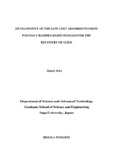Please use this identifier to cite or link to this item:
http://archive.nnl.gov.np:8080/handle/123456789/337Full metadata record
| DC Field | Value | Language |
|---|---|---|
| dc.contributor.author | PANGENI, BIMALA | |
| dc.date.accessioned | 2019-03-25T07:03:41Z | |
| dc.date.accessioned | 2020-08-21T07:33:27Z | - |
| dc.date.available | 2019-03-25T07:03:41Z | |
| dc.date.available | 2020-08-21T07:33:27Z | - |
| dc.date.issued | 2019-03-25 | |
| dc.identifier.uri | http://103.69.125.248:8080/xmlui/handle/123456789/337 | - |
| dc.description.abstract | The wide application of gold to make traditional jewelries as well as in different electronic devices such as computers, mobile phones, and other high tech electronic appliances increases its demand every year thus the gold ore are continuously mined to fulfill its demand which will invites the trouble of gold ore exhaustion in near future. The customer are expecting more and more advanced or improve technology thus more sophisticated and technologically advanced electronic devices were invented that replaces the old electronic devices thus large amount of electronic waste is generated every year. In addition, the conventional cyanide treatment for the extraction of gold is toxic that produces large volume of toxic cyanide solution which is not environmentally benign. The invention of new recovery method of gold from primary (gold ore) and secondary (wasted electronic devices) sources with convenient, low cost, and environmentally benign technology is required. From the literature it was found that cellulose is most abundant material in the world which is found mostly in plants. In the present work, new recovery method was invented for the recovery of gold from trace concentration by using chemically modified cellulose derived from agricultural plants, and compared with commercially available cellulose together with some other polysaccharides contains similar functionality such as dextran, alginic acid, and pectic acid. It was found that natural and commercial cellulose containing hydroxyl functional group showed very high affinity and selectively adsorbed gold from trace concentration even in the presence of other coexisting base metals and precious metals. The traditional and industrial values of gold, conventional way of recovering gold their disadvantages are systematically described together with the advantages of novel, economic and environmentally benign technology investigated in this research work in | en_US |
| dc.language.iso | en | en_US |
| dc.subject | technology | en_US |
| dc.title | An Ethnobotanical Approach to Study the Relation between Community Vulnerability and Climate Change in the Himalayas | en_US |
| dc.type | Thesis | en_US |
| Appears in Collections: | 500 Natural sciences and mathematics | |
Files in This Item:
| File | Description | Size | Format | |
|---|---|---|---|---|
| Bimala Pangeni (Ph.D.) Thesis .pdf | 8.64 MB | Adobe PDF |  View/Open |
Items in DSpace are protected by copyright, with all rights reserved, unless otherwise indicated.